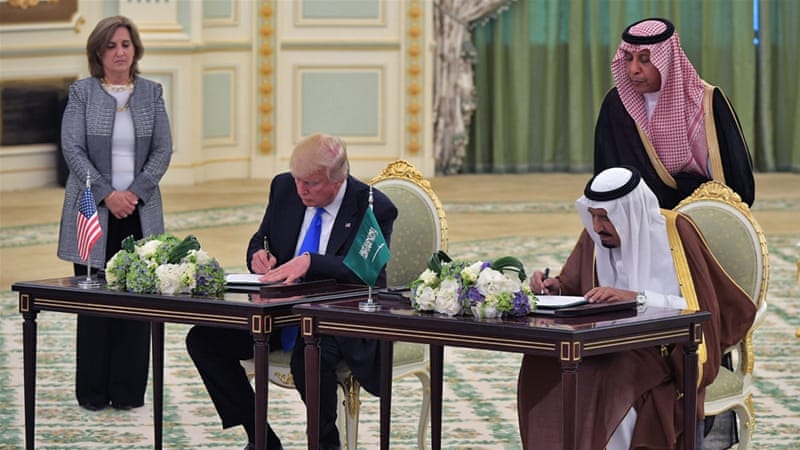Questions raised over $110bn arms deal to Saudi Arabia
Donald Trump green-lighting weapon sales that Obama withheld because of concerns over the humanitarian crisis in Yemen….
Donald Trump green-lighting weapon sales that Obama withheld because of concerns over the humanitarian crisis in Yemen.

Washington DC – President Donald Trump’s highly touted deal to sell Saudi Arabia $110bn in American weapons is coming under new scrutiny in Washington where politicians are increasingly concerned about the kingdom’s conduct of the war in Yemen and, now, the sudden blockade of Qatar.
As details have emerged about the arms sale, it’s become clear the $110bn value Trump claimed is exaggerated. The new sales are actually just proposed offers and most of the underlying weapons systems were previously organised under former president Barack Obama.
Congress is poised to vote in coming days on a resolution of disapproval of a portion of the announced deal. US law provides Congress an opportunity to veto arms sales to foreign countries. While Republican lawmakers are likely to support their president, the resolution will draw more than 40 supporters in the Senate, more than previous measures and a sign of trouble for Riyadh.
“The $110 billion is definitely inflated, but it’s not zero,” said William Hartung, an arms trade analyst at the Center for International Policy in Washington.
|
|
“It’s very hard to evaluate. They haven’t been very specific about some of the categories they are talking about,” Hartung told Al Jazeera.
What’s new is Trump’s offer to the Saudis of the US’ high-tech THAAD missile defense system, now being deployed in South Korea, and the proposed future sale of 150 Blackhawk combat helicopters, as well as new cyber-warfare capabilities. These are all future propositions, analysts say.
More practically and immediately, Trump is green-lighting sales of precision-guided, air-to-ground missiles that Obama had withheld because of concerns over the humanitarian crisis in Yemen and civilian casualties.
In addition, Trump is moving forward to replenish and expand the Saudi’s supply of battle tanks and armoured vehicles, replacing equipment damaged in the Yemen conflict.
“The Saudis are in a war in Yemen and they need weapons. You want to win, you need weapons,” Senator John McCain, a Republican, told Al Jazeera. “We are in a war.”
Separately, Lockheed Martin and Raytheon both announced major sales in connection with Trump’s trip. But “this seems more in the nature of a promise than a finished deal”, Hartung said.
READ MORE: Qatar diplomatic crisis: All the latest updates
Bruce Riedel, a senior fellow and foreign policy analyst at the Brookings Institution in Washington, published a blog post earlier this week saying Trump’s announced weapons deal with the Saudi’s was “fake news”.
“There is no $110bn deal,” Riedel said. “Instead there are a bunch of letters of intent, but not contracts.”
About $24bn of the claimed $110bn in Trump’s deal are weapons sales that were already in the pipeline, analysts say. Obama had offered the Saudis and other Gulf states new military assistance to gain acquiescence to the Iran nuclear deal in 2015.
Trump attempted to score political points at home with the agreement, announced during his visit to Riyadh, by touting the economic value to US defense contractors. He claimed it would create “many thousands of jobs”.
Previously announced sales included more than $7bn in munitions and support for the war in Yemen, $3.5bn in Chinook cargo helicopters, and $1.15bn in tanks and armoured vehicles, according to a fact sheetput out May 20 by the Defense Security Cooperation Agency.
|
|
“That $110 billion is a mix of old sales and future prospective sales that have not been announced or signed,” Senator Chris Murphy, a Democrat, told Al Jazeera.
Four US senators led by Murphy are demanding a Senate vote disapproving of that portion of the arms sales related to guided missiles that Obama would not have approved. A companion measure is pending in the House of Representatives.
Citing the suffering of civilians in Yemen’s war, US Senator Ben Cardin said on Wednesday he would oppose arms sales to Saudi Arabia.
He noted the “catastrophic” humanitarian crisis with millions of Yemenis on the brink of famine, and hundreds of thousands at risk from a cholera outbreak.
“Given this deplorable context, I am disappointed that we have yet to learn of the administration’s strategy to support a political process, or any statement from the administration that more military action in Yemen is counterproductive, will disproportionally affect civilians, and will likely generate conditions for expanded activities by Al Qaeda and Iran, as well as Russian influence. Instead, this administration’s approach appears to be more weapons sales,” Cardin said in a statement.
With the Saudis’ surprise moves against Qatar, positions of senators on Murphy’s resolution are “shifting hour to hour”, said Trevor Thrall, a senior fellow at the Cato Institute, a Washington-based think-tank.
“It means something different to vote against this resolution now than it did a few days ago. Now a vote against it looks like it is more of a blank check to Saudi Arabia,” Thrall told Al Jazeera.
READ MORE: US and Saudi Arabia sign arms deals worth almost $110bn
Trump’s speech to a gathering of Muslim leaders in Riyadh on May 21 was widely interpreted as a signal the new American president would not raise human rights issues. Instead the US will focus on combating “terrorism”, for which Trump placed primary blame on Iran in the speech.
Middle East experts in Washington were scrambling to understand what prompted the Saudi move and how Trump’s conduct may have encouraged it. Qatar is a US ally and host of a major military air base, the biggest in the Middle East.
“It’s possible just his blanket endorsement of the Saudis may have emboldened them to do something they’ve been wanting to do for a while. And they are certainly hoping to escalate the tensions with Iran. I don’t think they thought Qatar was on board with that,” Hartung said.
|
|
Source: Al Jazeera News

